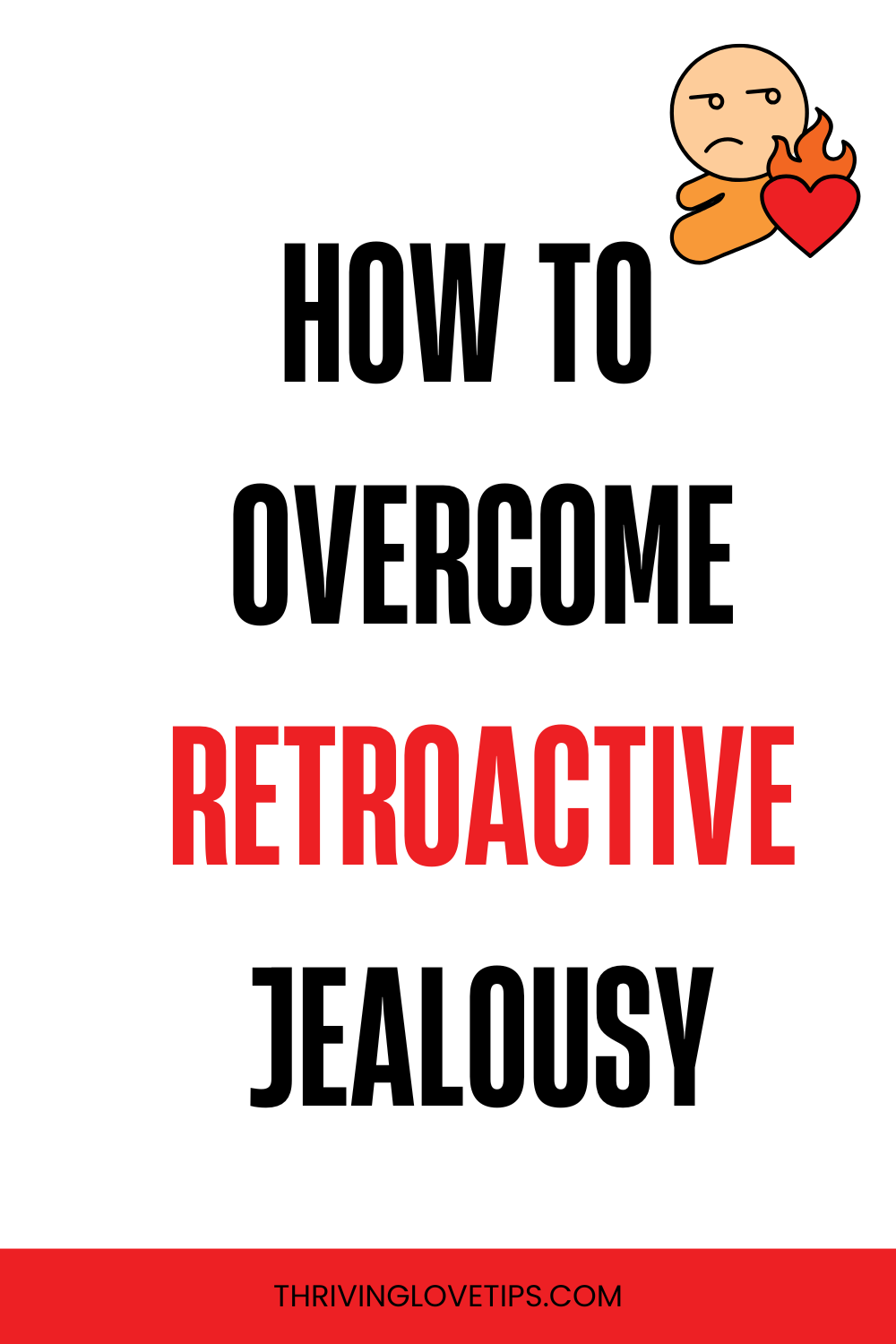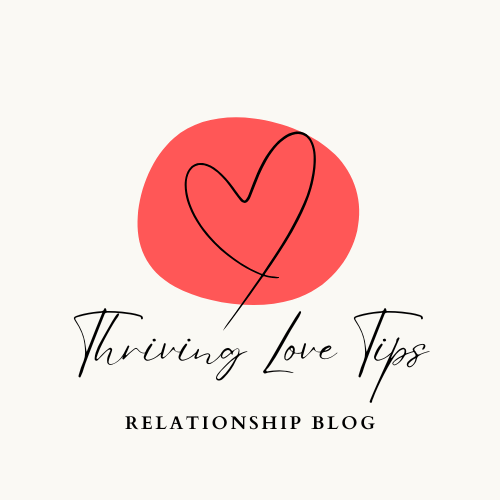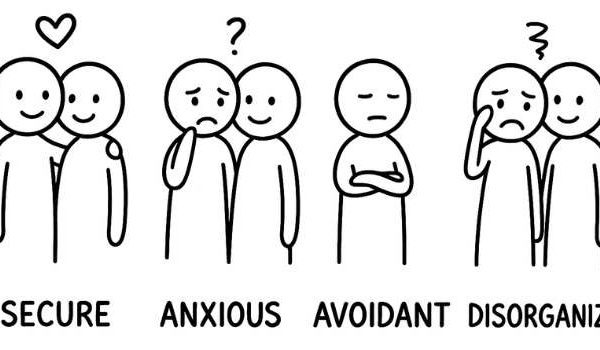You’re lying in bed next to someone you love, someone who chose you, someone who’s with you right now. But instead of feeling happy and secure, your mind is racing with intrusive thoughts about their past relationships. You imagine them with their ex, wonder if they were happier then, and obsess over details of their previous sex life. You know logically that the past is the past, that it doesn’t threaten your present, but your emotions haven’t gotten that memo.
This torture has a name: retroactive jealousy. It’s a painful obsession with your partner’s romantic or sexual history that can consume your thoughts, damage your relationship, and make you feel like you’re going crazy. Unlike normal jealousy about current threats to your relationship, retroactive jealousy focuses on things that happened before you were even in the picture. You’re jealous of ghosts, of memories, of a past you can’t change and shouldn’t have to compete with.
If you’re struggling with retroactive jealousy, you’re not alone, and you’re not broken. This is a surprisingly common issue that many people experience but few talk about openly. The shame of feeling jealous about something that happened before you existed in your partner’s life can make you feel irrational and petty. But these feelings, while painful and sometimes destructive, are actually rooted in understandable psychological patterns that can be addressed and overcome.
The good news is that retroactive jealousy is not a life sentence. With awareness, effort, and the right strategies, you can break free from this exhausting cycle and build a healthier relationship with both your partner and their past.

Understanding What’s Really Happening
Before you can overcome retroactive jealousy, you need to understand what’s actually driving it. On the surface, it looks like you’re upset about your partner’s past relationships or sexual experiences. But dig deeper, and you’ll usually find that retroactive jealousy is really about something else entirely: your own insecurities, your fears about the relationship, or unresolved issues from your past.
Dr. Robert Leahy, a clinical psychologist who studies jealousy, explains that retroactive jealousy often stems from comparison and the fear of not measuring up. “You’re not really threatened by your partner’s ex. You’re threatened by the idea that maybe you’re not as good, as attractive, as sexually compatible, or as important as they were.”
This type of jealousy can also be driven by anxiety about abandonment. If your partner has a history of past relationships, your anxious mind might fixate on the fact that those relationships ended. What if they get bored with you too? What if they realize their ex was actually better? What if history repeats itself? The past becomes a lens through which you view your own relationship’s potential failure.
For some people, retroactive jealousy is connected to their own past experiences. Maybe you were cheated on before, or maybe you grew up with models of unstable relationships. These experiences can create hypervigilance about threats to your current relationship, even when those threats are imaginary or long past.
Understanding the root cause doesn’t make the feelings disappear instantly, but it does help you recognize that this isn’t really about your partner’s past. It’s about your present fears and insecurities, which is actually good news because those are things you can work on and change.
Stop Feeding the Beast
Retroactive jealousy thrives on information. The more details you know about your partner’s past, the more material your mind has to obsess over, to create vivid mental images about, to torture yourself with. One of the most important steps in overcoming this pattern is to stop actively seeking information about your partner’s history.
This means resisting the urge to ask questions about their exes, their past relationships, or their sexual history. It means not scrolling through their ex’s social media profiles at 2 AM. It means not fishing for details or comparisons. Every time you seek out new information, you’re essentially feeding the jealousy, giving it more fuel to burn.
Psychologist Dr. Guy Winch, who writes about emotional health, describes this behavior as a form of self-harm. “You’re deliberately exposing yourself to information that you know will cause you pain. It’s like picking at a wound that’s trying to heal. You have to consciously stop this behavior.”
If your partner volunteers information about their past, you have every right to say, “I appreciate your openness, but I’d prefer not to know those details.” This isn’t about demanding they hide their history or pretend it didn’t happen. It’s about protecting your mental health by not filling your mind with unnecessary information that will only fuel obsessive thoughts.
You also need to stop comparing yourself to their exes. This is easier said than done, but it’s crucial. Every person is different, every relationship is unique, and comparison is truly the thief of joy. Your partner isn’t with their ex. They’re with you. That choice, made freely and continuously, is what matters.
When you feel the urge to ask a question about their past or to look up an ex online, pause. Recognize that urge for what it is: a compulsion that will only make things worse. Then consciously choose a different behavior, like going for a walk, calling a friend, or engaging in a hobby that absorbs your attention.
Challenge Your Intrusive Thoughts
Retroactive jealousy creates a loop of intrusive, obsessive thoughts that can feel impossible to escape. Your mind creates vivid scenarios about your partner’s past, often making things seem worse than they likely were. These thoughts pop up uninvited and can completely hijack your mood and your ability to be present in your relationship.
Cognitive behavioral therapy (CBT) offers powerful tools for dealing with intrusive thoughts. The key is not to try to suppress the thoughts, which usually backfire, but to recognize them for what they are: just thoughts, not facts, and not accurate predictions about your relationship.
Dr. Sally Winston, who specializes in anxiety disorders, recommends a technique called cognitive defusion. Instead of trying to fight the thought “My partner was more attracted to their ex than to me,” you reframe it as “I’m having the thought that my partner was more attracted to their ex.” This creates distance between you and the thought, helping you recognize it as a mental event rather than truth.
Another technique is to challenge the thought with evidence. When you find yourself thinking, “Their ex was probably better than me,” ask yourself: What evidence do I actually have for this? If my best friend had this thought, what would I tell them? What evidence contradicts this thought? Usually, the evidence is overwhelmingly in favor of the fact that your partner chose you and continues to choose you.
You can also use the “so what?” technique. Okay, so your partner had relationships before you. So what? That’s normal. That’s what led them to learn what they wanted in a partner, which ultimately led them to you. Their past relationships didn’t work out, which is why they’re available to be with you now. When you really follow the thought to its logical conclusion, it often loses its power.
Keep in mind that overcoming intrusive thoughts is a practice, not a one-time fix. You’ll need to challenge these thoughts repeatedly, consistently, until new mental patterns form. Be patient with yourself in this process.
Focus on the Present Relationship
One of the most effective antidotes to retroactive jealousy is actively investing in your current relationship. When you’re fully present and engaged with your partner, when you’re creating new memories and building intimacy, you have less mental space for obsessing about the past.
Make a conscious effort to notice and appreciate the good things in your relationship right now. What makes your partner smile? What do you love about spending time together? What are you building together? These present-moment experiences are what actually matter, not what happened with someone else years ago.
Dr. Stan Tatkin, founder of the Psychobiological Approach to Couple Therapy, emphasizes the importance of building what he calls “couple bubbles” of shared positive experiences. “The more you invest in creating your own unique relationship culture, the less relevant anyone else’s history becomes. You’re writing your own story together.”
This also means working on your intimacy and connection. Often, retroactive jealousy flares up when the relationship feels less secure or connected. Are you spending quality time together? Are you communicating openly? Are you maintaining physical and emotional intimacy? Strengthening these aspects of your relationship can reduce the anxiety that fuels retroactive jealousy.
Consider creating new traditions and experiences that are uniquely yours as a couple. Visit places they’ve never been with anyone else. Create inside jokes and shared references. Build a life together that’s so full and rich that the past fades into irrelevance not because you’re ignoring it, but because your present is simply more important and more real.
When you catch yourself spiraling into thoughts about your partner’s past, actively redirect your attention to something concrete in the present. Look at your partner right now. Remember why you love them. Recall a recent moment that made you happy. Ground yourself in the reality of your current relationship rather than the imagined threat of past ones.
Address Your Own Insecurities
Retroactive jealousy is usually a symptom of deeper insecurity, and lasting relief requires addressing those underlying issues. This might be the hardest part of the process, but it’s also the most transformative.
Start by identifying what you’re actually insecure about. Is it your physical appearance? Your sexual experience or performance? Your worthiness of love? Your fear of abandonment? Getting specific about your insecurities helps you address them directly rather than projecting them onto your partner’s past.
Once you’ve identified your insecurities, work on building yourself up in those areas. If you’re insecure about your appearance, this might mean developing a healthier relationship with your body through exercise, self-care, or even therapy. If you’re insecure about your sexual experience, this might mean having open conversations with your partner about what you both enjoy and want to explore together.
Therapist Zachary Stockill, who specializes in retroactive jealousy, emphasizes that self-worth work is essential. “You have to genuinely believe that you’re worthy of love and that you bring value to the relationship. When you truly believe that, your partner’s past becomes much less threatening.”
This often means challenging deeply held beliefs about yourself. If you’ve always thought of yourself as “not good enough,” that belief will color everything, including how you view your partner’s past relationships. Working with a therapist can be incredibly helpful for unpacking and changing these core beliefs.
It’s also important to recognize that having a past doesn’t make your partner damaged or less valuable. Most adults have relationship and sexual histories, and that’s normal and healthy. Your partner’s experiences helped shape who they are today, including the person who chose to be with you. Viewing their history as something neutral or even positive rather than threatening can shift your entire perspective.
Communicate Without Interrogating
While you shouldn’t be asking endless questions about your partner’s past, you do need to communicate about how you’re feeling. Retroactive jealousy creates distance when you suffer in silence, letting these obsessive thoughts eat away at you without your partner even knowing there’s a problem.
Have an honest conversation with your partner about your struggle. Explain that you’re dealing with intrusive thoughts about their past and that it’s something you’re working on. This isn’t their problem to fix, but they deserve to know what you’re going through, especially if your jealousy has been affecting your behavior or your intimacy.
Dr. Sue Johnson, developer of Emotionally Focused Therapy, emphasizes the importance of expressing underlying fears rather than just the jealousy. Instead of “I’m jealous of your ex,” try “I’m struggling with feeling insecure about whether I’m enough for you.” This vulnerability invites connection rather than defensiveness.
Set boundaries around discussions of the past. You might say something like, “I’m working through some insecurity about your past relationships. It would really help me if we could avoid detailed discussions about your exes for now.” Most partners will be understanding and willing to accommodate this reasonable request.
At the same time, be clear that you’re taking responsibility for your feelings. This isn’t about blaming your partner for having a past or expecting them to fix your jealousy. You’re simply sharing what you’re experiencing and asking for support as you work through it.
If your partner is understanding and supportive, let them reassure you when you need it. There’s nothing wrong with occasionally needing to hear “I love you” or “You’re the one I want to be with.” Just be careful not to make this a constant need that puts pressure on them to continually prove their feelings.
Know When to Seek Professional Help
For some people, retroactive jealousy is so severe and persistent that self-help strategies aren’t enough. If your jealousy is consuming hours of your day, severely impacting your relationship, or causing you significant distress, it’s time to seek professional help.
A therapist, particularly one trained in cognitive behavioral therapy (CBT) or obsessive-compulsive disorder (OCD), can provide specialized tools for managing intrusive thoughts and anxiety. Some cases of severe retroactive jealousy actually have features of OCD, with the intrusive thoughts and compulsive behaviors (like repeatedly asking questions or checking social media) forming a clinical pattern that responds well to treatment.
Couples therapy can also be valuable, especially if your jealousy has created significant conflict or distance in your relationship. A skilled couples therapist can help you communicate more effectively, address underlying relationship issues, and work together toward healing.
Don’t let shame prevent you from getting help. Retroactive jealousy is more common than you think, and therapists are familiar with helping people overcome it. Seeking help isn’t a sign of weakness. It’s a sign that you’re committed to your own well-being and to building a healthy relationship.
Give Yourself Grace in the Process
Overcoming retroactive jealousy isn’t a linear process. You’ll have good days and bad days. You’ll make progress and then have setbacks. You’ll think you’re past it and then have a trigger that brings it all flooding back. This is normal and expected. Be patient and compassionate with yourself.
Remember that your partner’s past is literally unchangeable. No amount of jealousy, worry, or obsession will make it go away or be different. The only thing you can change is how you relate to that past and how you choose to show up in your present relationship.
Every moment you spend obsessing about something that happened before you were together is a moment you’re not fully present in the relationship you actually have. Your partner is here, now, choosing you. That’s what matters. That’s what’s real.
Focus on building something so beautiful and strong in the present that the past becomes an irrelevant footnote. Create a relationship so full of love, trust, and connection that looking backward holds no appeal because moving forward together is so much more compelling.
You deserve to be free from this torture. Your partner deserves to be with someone who’s fully present rather than haunted by ghosts. And your relationship deserves the chance to thrive without the shadow of the past hanging over it. With effort, awareness, and compassion for yourself, you can get there. The past is past. Your future together is what you make it.




